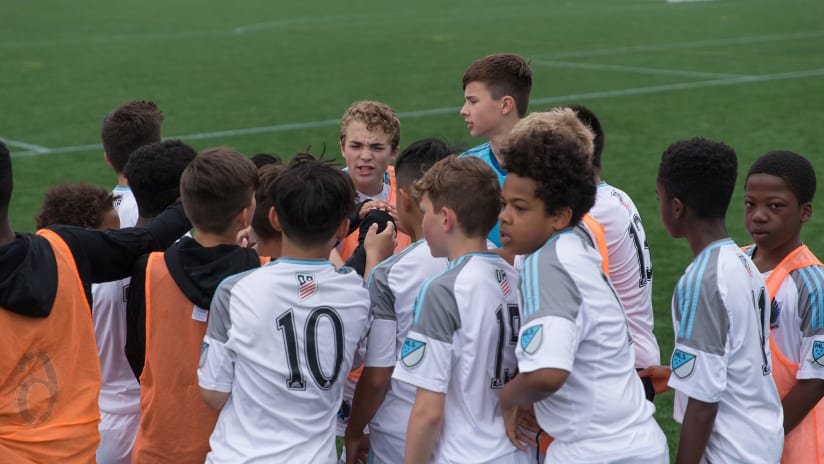In June of last year, Minnesota United’s Development Academy held its first trials as it worked to build its U13 and U14 rosters for its first year of competition. A year in, much has happened already with the Development Academy, which has grown from a plan to provide a superior soccer education within a professional club environment and a pathway to pro soccer into a fully-fledged program with a bright future. Among other achievements in their first year, Academy Director Tim Carter and his still growing staff started a Pre-Development Academy for U11s and U12s, established a daily training environment that fosters player growth, and connected with directors of coaching in the community.
A year ago, the Academy began with a plan to fill out the aforementioned U13 and U14 teams and then see how the players and programs aged up into U15 and U17 teams. But it quickly became apparent after more than 250 kids showed up for the trials that interest in the program was outstripping the planned rosters of about 20 players each for the first two teams. With so many young players showing up, the decision was made to accelerate the plan for the Pre-Development Academy and get it quickly up to speed as a supplemental program. This meant athletes could continue to play for their home clubs while training once a week at the National Sports Center in Blaine.
In addition to that training, members of the Pre-DA have also been able to go to St. Louis for a tournament with the U13 and U14 teams, plus go to the U.S. Soccer futsal showcase in February and the Generation adidas Cup in Dallas in March. The last of those was a massive opportunity for players to get a sense of what the program entails at the higher levels. The Pre-DA also provides an essential stepping stone for the Academy as a whole because it gets players into the pipeline earlier and makes evaluation much more effective over the long run. It is, of course, easier to understand how a player might fit with the U13 and U14 teams if you’ve worked with him for several years instead of seeing him for a few hours at a trial.
Every opportunity like building the Pre-DA comes along with challenges, though, and it becomes clear through talking to members of the DA coaching staff that one of the main challenges over the past year has been working with players on their emotional state and helping them to understand and work with their emotions. Because of that, one of the major additions to the program has been bringing in Simon Almaer from Premier Sports Psychology as a mental skills coach who works with both players and parents. This is, after all, a program that is going to see kids who both will and won’t make it at various levels as they move through their youth soccer careers. It helps to have the right mindset going into each challenge that comes their way.
It’s all part of what the staff call a “daily training environment.” The Academy’s programs demand more and the goal is to emphasize training. This isn’t showing up for an afternoon and then hitting the pitch for a match. By building a program founded on daily training, the DA hopes to foster a professional environment that will not only show dividends in player development within the Academy, but will also raise the level of soccer training throughout the community. To that end, the DA wants to expand its footprint across the region, and that means not just a bigger footprint but a deeper one. Bolstering its connection to youth programs throughout the region will help the Academy identify talent, educate that talent and integrate players into the Academy so they can train up or down, including players in the U17 and U19 groups to eventually warm up with or even train with the first team. And at the USA Cup — one of the world’s largest youth soccer tournaments, hosted at NSC — there will be an MNUFC Division where international and MLS youth teams will compete with MNUFC academy teams.
A major part of the DA’s footprint in the soccer community will be through the affiliate program, which began this year with Dakota Alliance. The program is a way to connect Minnesota United’s academy to other youth clubs throughout the region and provide value in both directions. The plan is to expand that number of affiliates to three or four over the next few years.
Beyond the programs, the staff will continue to grow, including the additions of goalkeeping coach Jeremy Clark and Angel Rivillo, who will be an age group head coach and will serve as the Academy’s scouting coordinator. Some of the Academy’s goals for the next year are to improve the daily training environment they’ve established, improve the pool of talent they have and expand the Pre-Development Academy further.
If all that the program has accomplished in its first year and all it hopes to do in the future sounds like a lot, it is. But the goal above all else remains training players at the highest level possible and by doing so, creating a pathway from youth soccer to professional soccer. Sometimes the most tangible things on that journey can be the smallest things, as reflected in a story told by Academy General Manager Ryan Brooks.
“We were on the trip back from Columbus,” he begins. This was just a few weeks ago, and kids on the bus will often play with their phones or watch movies. But the Minnesota United first team was in Seattle facing Sounders FC and the match was on. “We turned around and all 35 of them were sitting there watching the game. Supporting the first team was a surprise. In the beginning, they did not even know who the players were on the team. Now they know when the games are and we watch them when we’re on the bus or when we can. They’re seeing their connection to the first team and saying, ‘This could be me one day.’”





